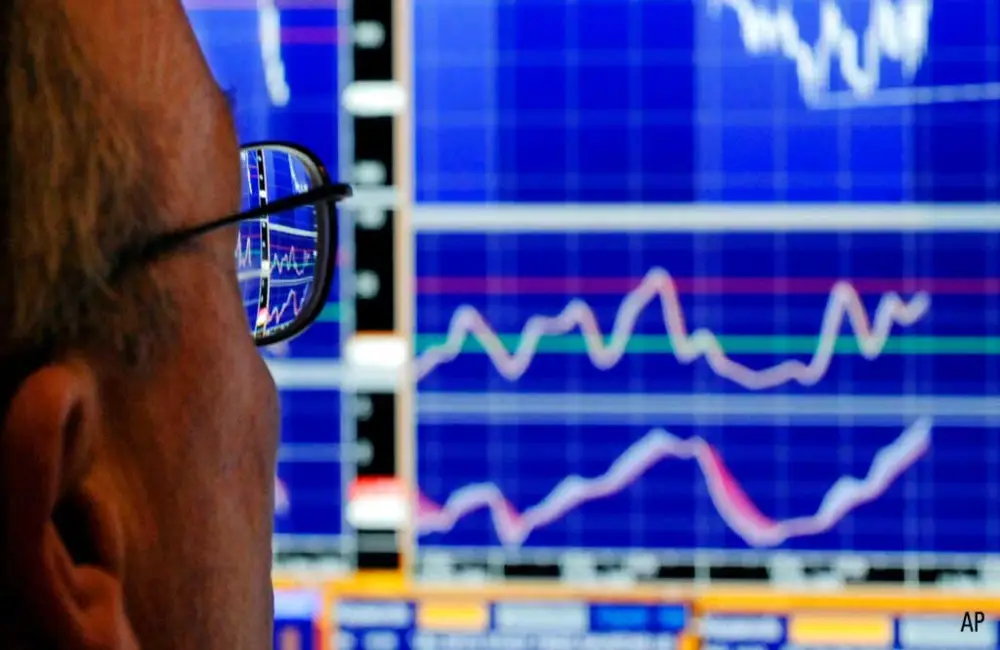ASX futures were 45 points or 0.6% higher at 7146 at 8:00 am on Wednesday, citing a rise at the open that may reverse Tuesday’s heavy losses after the Reserve Bank’s surprise double hike rate hike.
Overseas, the S&P 500 climbed 1% on the back of gains in 10 of the index’s 11 sectors. The Nasdaq Composite rose 0.9%. The Dow Jones Industrial Average rose 0.8%. The three indexes opened slightly lower after a profit warning from Target raised doubts about the retail sector.
Shares of Target fell 2.3 percent after the retailer warned that its profit would fall because it has to cancel orders or offer discounts to clear out unwanted goods, a possible sign of lower consumer spending. Other large retailers’ shares trailed, including Walmart, down 1.2 percent.
“We still are in this tug of war around where inflation is going to be, where growth is going to be and whether we are or aren’t going to be in recession,” said Fahad Kamal, chief investment officer at Kleinwort Hambros.
On the local front, the S&P/ASX 200 closed down 1.5% at 7095.7 following a bigger-than-expected rate hike from the RBA.
The ASX 200 was already down some 1% in mid-afternoon before it dropped further when the RBA lifted its cash rate by 50 basis points to 0.85%, instead of 25 bps most of the economists were expecting.
All the sectors declined, led by tech, real-estate, consumer-discretionary and financial stocks. Two banks, Block, Xero and WiseTech lost 2.9% to 5.25%, while property groups Mirvac, Stockland and Goodman lost 3.2% to 3.7%.
Shares in banks ANZ, Westpac, Commonwealth and NAB fell between 1.5% and 3.25%.
The worst-performing ASX 200 component was buy-now-pay-later operator Zip, which slumped 14% to a near five-year low.
Brent crude rose 0.9% to US$120.57 a barrel in commodity markets. Iron ore climbed 0.3% to US$147.25. Gold rose 0.15% to US$1854.90.
In local bond markets the big sell off after the Reserve Bank’s surprise interest rate decision saw the yield on Australian 2 Year government bonds rise to 2.76% as the 10 Year yielded 3.55%. The yield on 2 year Treasury notes in the US held steady at 2.73% and the yield on 10 year US Treasury notes dipped to 2.97%.
The Australian dollar was at 72.30 US cents, well above 71.93 US cents at close previously. The Wall Street Journal Dollar Index, which measures the US dollar against 16 other currencies fell to 95.15.
Asia
Chinese stocks closed the session mixed. The Shanghai Composite Index gained 0.2 percent to 3,241.76, the Shenzhen Composite Index ended flat at 2,072.58, while the ChiNext Price Index was unchanged at 2,554.63. Developments related to the coronavirus will continue receiving scrutiny, including some moves by Beijing to reopen on Monday, such as the lifting of limits on dining in restaurants. But investors are expected to stay cautiously optimistic, as new Covid-19 outbreaks in the country along with new lockdowns in some areas of Shanghai might hinder its economy. Shares of auto stocks weakened, with SAIC Motor down 2.4% and Great Wall Motor falling 3.5%.
Hong Kong’s Hang Seng Index declined 0.6% to 21531.67 after US stock futures slipped. The benchmark pulled back from the previous day’s gains, with consumer-products and auto stocks retreating, though the tech sector was little changed. JD.com spiked 3.0% while Alibaba Group was up 1.9%. Sunny Optical was the worst performer with a 5.1% drop, followed by China Resources Beer, China Mengniu Dairy and Nongfu Spring, which fell 2.7%-3.0%. BYD Co. fell 2.3% to break a six-session winning run, while Geely Automobile lost 2.0%. Gainers included Hang Lung Properties, which added 3.2%, and Wuxi Biologics, which built on yesterday’s surge, and was up 2.8%.
Japanese shares closed modestly higher, driven by gains for auto shares, as the yen weakened to another 20-year low. Subaru Corp. rose 3.2% and Nissan Motor advanced 2.6%. The Nikkei Stock Average rose 0.1%, to 27943.95.
Europe
European equities fell under pressure from worries over central bank tightening of monetary policy to counter inflation and weak economic data. The pan-European Stoxx Europe 600 fell 0.3%, the German DAX was 0.7% lower and the French CAC 40 lost 0.7%.
“Having had such a positive session in Europe yesterday European markets have settled back on a trio of concerns over higher prices higher rates, and shrinking margins in the wake of the Reserve Bank of Australia's surprise to consensus by raising its headline rate by more than expected,” CMC Markets analyst Michael Hewson says in a note. He says sentiment was also hit by weaker-than-expected economic data including German factory orders and Britain’s BRC retail sales figures.
London’s FTSE 100 Index dropped 0.1% to 7,598.9 as wider declines overshadowed advances in the miners and oil sector. The index was topped by Melrose Industries, up 3.1%, and Rio Tinto, up 2.3%. Among the biggest fallers, JD Sports Fashion slid 3.9% after a provisional finding from the U.K. regulator it broke competition laws.
“A downward revision to the World Bank’s growth forecasts has served a reminder to investors of the wider woes, even while some of the most gloomy predictions are pulled in,” IG chief market analyst Chris Beauchamp says. Beauchamp says that while the immediate impact now appears to be priced in, numbers will turn ugly when the next US reporting season kicks off in August, meaning bytop December stocks could be under pressure again on elevated valuations.
North America
US stock indexes rose in a volatile session on Tuesday as investors continued to weigh the outlook for inflation and economic growth.
The S&P 500 gained 1%, fueled by advances in 10 out of the 11 sectors in the index. The Nasdaq Composite rose 0.9%. The Dow Jones Industrial Average rose 0.8%. The three indexes had opened slightly lower, after the retailer Target warned of a profit miss, darkening the mood in the retail sector.
Stocks have swung in the past few days, buffeted by changing perceptions of the economy’s strength and the likely track for central banks and interest rates. The main worry here is that central banks will be too aggressive in tackling inflation, triggering a slowdown in economic growth, or even a recession.
“We’re still in this tug-of-war on what inflation is going to be, what growth is going to be, whether we are in a recession or not,” said Fahad Kamal, chief investment officer at Kleinwort Hambros.
Shares of Target fell $3.69, or 2.3 percent, to $155.98 after the retailer warned that its profit would fall because it has to cancel orders or discount prices to get rid of unwanted merchandise, a possible sign of lower consumer spending. Shares of other large retailers followed, with Walmart down $1.50, or 1.2 percent, at $123.37.
A large inflow of retail inventories and weaker demand could lead prices for most consumer goods to moderate during the second half of the year, said Peter Essele, head of portfolio management at Commonwealth Financial Network.
“That would be a good thing for inflation overall and that helps maintain buoyancy in markets that inflation continues to pull back,” Mr. Essele said.
The US trade deficit in April narrowed to $87.1 billion, a bigger contraction than economists had predicted, after hitting a record shortfall in the previous month. Among other key releases this week will be the consumer-price index on Friday, which will be scrutinized for signals about whether inflation is weakening or not.
Inflation will continue to show elevated levels, Treasury Secretary Janet Yellen said in testimony in the Senate on Tuesday. Some investors believe inflation has already peaked but aren’t sure how quickly high prices will come down.
“As long as inflation is high, and as long as inflation is working its way down very slowly, the Fed is going to keep raising interest rates to try to bring down these high inflation rates,” said Ayako Yoshioka, a senior portfolio manager at Wealth Enhancement Group. “This is a very hard thing for the Fed to achieve a soft landing.”
The yield on the key 10-year Treasury note dipped to 2.969% from 3.037% on Monday. Yields fall when prices rise.
“It tells you the market has not decided that we’re going to have a recession, or if we have one, how bad it will get,” said Julien Lafargue, the chief market strategist at Barclays Private Bank. “That’s probably what you’d want to own if you think we’re going into recession.”
In other corporate news, Kohl’s rose $3.97, or 9.5 percent, to $45.59 after The Wall Street Journal reported the department-store chain was in exclusive talks to be sold to the retail holding company Franchise Group. The deal could value the company at roughly $8 billion.
The arcade company Dave & Buster’s Entertainment added $1.81, or 4.9 percent, to $39.06 after announcing that sales growth had surged.
BuzzFeed shares rose 6 cents, or 2.7%, to $2.29, making back some ground after sinking 41% on Monday after the ban on executives and large investors from selling shares had been lifted.
Twitter’s shares gained 57 cents, or 1.4 percent, to $40.13 after Elon Musk threatened to walk away from his deal to acquire the social-media platform on Monday, saying the company had refused to provide him with documents related to spam accounts.























